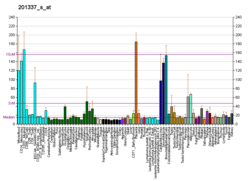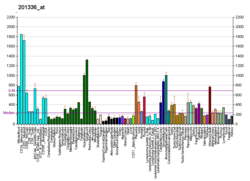VAMP3
Vesicle-associated membrane protein 3 is a protein that in humans is encoded by the VAMP3 gene.[5][6]
Synaptobrevins/VAMPs, syntaxins, and the 25-kD synaptosomal-associated protein are the main components of a protein complex involved in the docking and/or fusion of synaptic vesicles with the presynaptic membrane. This gene is a member of the vesicle-associated membrane protein (VAMP)/synaptobrevin family. Because of its high homology to other known VAMPs, its broad tissue distribution, and its subcellular localization, the protein encoded by this gene was shown to be the human equivalent of the rodent cellubrevin. In platelets the protein resides on a compartment that is not mobilized to the plasma membrane on calcium or thrombin stimulation.[6]
Interactions
VAMP3 has been shown to interact with
References
- 1 2 3 GRCh38: Ensembl release 89: ENSG00000049245 - Ensembl, May 2017
- 1 2 3 GRCm38: Ensembl release 89: ENSMUSG00000028955 - Ensembl, May 2017
- ↑ "Human PubMed Reference:".
- ↑ "Mouse PubMed Reference:".
- ↑ Bernstein AM, Whiteheart SW (Apr 1999). "Identification of a cellubrevin/vesicle associated membrane protein 3 homologue in human platelets". Blood. 93 (2): 571–9. PMID 9885218.
- 1 2 "Entrez Gene: VAMP3 vesicle-associated membrane protein 3 (cellubrevin)".
- ↑ Annaert WG, Becker B, Kistner U, Reth M, Jahn R (December 1997). "Export of cellubrevin from the endoplasmic reticulum is controlled by BAP31". J. Cell Biol. 139 (6): 1397–410. PMC 2132629
 . PMID 9396746. doi:10.1083/jcb.139.6.1397.
. PMID 9396746. doi:10.1083/jcb.139.6.1397. - ↑ Hager HA, Roberts RJ, Cross EE, Proux-Gillardeaux V, Bader DM (February 2010). "Identification of a novel Bves function: regulation of vesicular transport". EMBO J. 29 (3): 532–45. PMC 2830705
 . PMID 20057356. doi:10.1038/emboj.2009.379.
. PMID 20057356. doi:10.1038/emboj.2009.379. - 1 2 Imai A, Nashida T, Yoshie S, Shimomura H (August 2003). "Intracellular localisation of SNARE proteins in rat parotid acinar cells: SNARE complexes on the apical plasma membrane". Arch. Oral Biol. 48 (8): 597–604. PMID 12828989. doi:10.1016/S0003-9969(03)00116-X.
- 1 2 Paumet F, Le Mao J, Martin S, Galli T, David B, Blank U, Roa M (June 2000). "Soluble NSF attachment protein receptors (SNAREs) in RBL-2H3 mast cells: functional role of syntaxin 4 in exocytosis and identification of a vesicle-associated membrane protein 8-containing secretory compartment". J. Immunol. 164 (11): 5850–7. PMID 10820264. doi:10.4049/jimmunol.164.11.5850.
- ↑ Freedman SJ, Song HK, Xu Y, Sun ZY, Eck MJ (April 2003). "Homotetrameric structure of the SNAP-23 N-terminal coiled-coil domain". J. Biol. Chem. 278 (15): 13462–7. PMID 12556468. doi:10.1074/jbc.M210483200.
- ↑ Rual JF, Venkatesan K, Hao T, Hirozane-Kishikawa T, Dricot A, Li N, Berriz GF, Gibbons FD, Dreze M, Ayivi-Guedehoussou N, Klitgord N, Simon C, Boxem M, Milstein S, Rosenberg J, Goldberg DS, Zhang LV, Wong SL, Franklin G, Li S, Albala JS, Lim J, Fraughton C, Llamosas E, Cevik S, Bex C, Lamesch P, Sikorski RS, Vandenhaute J, Zoghbi HY, Smolyar A, Bosak S, Sequerra R, Doucette-Stamm L, Cusick ME, Hill DE, Roth FP, Vidal M (October 2005). "Towards a proteome-scale map of the human protein-protein interaction network". Nature. 437 (7062): 1173–8. PMID 16189514. doi:10.1038/nature04209.
- ↑ Polgár J, Chung SH, Reed GL (August 2002). "Vesicle-associated membrane protein 3 (VAMP-3) and VAMP-8 are present in human platelets and are required for granule secretion". Blood. 100 (3): 1081–3. PMID 12130530. doi:10.1182/blood.V100.3.1081.
- ↑ Mallard F, Tang BL, Galli T, Tenza D, Saint-Pol A, Yue X, Antony C, Hong W, Goud B, Johannes L (February 2002). "Early/recycling endosomes-to-TGN transport involves two SNARE complexes and a Rab6 isoform". J. Cell Biol. 156 (4): 653–64. PMC 2174079
 . PMID 11839770. doi:10.1083/jcb.200110081.
. PMID 11839770. doi:10.1083/jcb.200110081.
Further reading
- Timmers KI, Clark AE, Omatsu-Kanbe M, et al. (1997). "Identification of SNAP receptors in rat adipose cell membrane fractions and in SNARE complexes co-immunoprecipitated with epitope-tagged N-ethylmaleimide-sensitive fusion protein.". Biochem. J. 320. ( Pt 2): 429–36. PMC 1217948
 . PMID 8973549. doi:10.1042/bj3200429.
. PMID 8973549. doi:10.1042/bj3200429. - Annaert WG, Becker B, Kistner U, et al. (1998). "Export of cellubrevin from the endoplasmic reticulum is controlled by BAP31.". J. Cell Biol. 139 (6): 1397–410. PMC 2132629
 . PMID 9396746. doi:10.1083/jcb.139.6.1397.
. PMID 9396746. doi:10.1083/jcb.139.6.1397. - Galli T, Zahraoui A, Vaidyanathan VV, et al. (1998). "A novel tetanus neurotoxin-insensitive vesicle-associated membrane protein in SNARE complexes of the apical plasma membrane of epithelial cells.". Mol. Biol. Cell. 9 (6): 1437–48. PMC 25366
 . PMID 9614185. doi:10.1091/mbc.9.6.1437.
. PMID 9614185. doi:10.1091/mbc.9.6.1437. - Riento K, Galli T, Jansson S, et al. (1999). "Interaction of Munc-18-2 with syntaxin 3 controls the association of apical SNAREs in epithelial cells.". J. Cell. Sci. 111. ( Pt 17): 2681–8. PMID 9701566.
- Prekeris R, Klumperman J, Chen YA, Scheller RH (1998). "Syntaxin 13 mediates cycling of plasma membrane proteins via tubulovesicular recycling endosomes.". J. Cell Biol. 143 (4): 957–71. PMC 2132958
 . PMID 9817754. doi:10.1083/jcb.143.4.957.
. PMID 9817754. doi:10.1083/jcb.143.4.957. - Paumet F, Le Mao J, Martin S, et al. (2000). "Soluble NSF attachment protein receptors (SNAREs) in RBL-2H3 mast cells: functional role of syntaxin 4 in exocytosis and identification of a vesicle-associated membrane protein 8-containing secretory compartment.". J. Immunol. 164 (11): 5850–7. PMID 10820264. doi:10.4049/jimmunol.164.11.5850.
- Antonin W, Holroyd C, Fasshauer D, et al. (2001). "A SNARE complex mediating fusion of late endosomes defines conserved properties of SNARE structure and function.". EMBO J. 19 (23): 6453–64. PMC 305878
 . PMID 11101518. doi:10.1093/emboj/19.23.6453.
. PMID 11101518. doi:10.1093/emboj/19.23.6453. - Wade N, Bryant NJ, Connolly LM, et al. (2001). "Syntaxin 7 complexes with mouse Vps10p tail interactor 1b, syntaxin 6, vesicle-associated membrane protein (VAMP)8, and VAMP7 in b16 melanoma cells.". J. Biol. Chem. 276 (23): 19820–7. PMID 11278762. doi:10.1074/jbc.M010838200.
- Antonin W, Fasshauer D, Becker S, et al. (2002). "Crystal structure of the endosomal SNARE complex reveals common structural principles of all SNAREs.". Nat. Struct. Biol. 9 (2): 107–11. PMID 11786915. doi:10.1038/nsb746.
- Poschet JF, Skidmore J, Boucher JC, et al. (2002). "Hyperacidification of cellubrevin endocytic compartments and defective endosomal recycling in cystic fibrosis respiratory epithelial cells.". J. Biol. Chem. 277 (16): 13959–65. PMID 11809765. doi:10.1074/jbc.M105441200.
- Mallard F, Tang BL, Galli T, et al. (2002). "Early/recycling endosomes-to-TGN transport involves two SNARE complexes and a Rab6 isoform.". J. Cell Biol. 156 (4): 653–64. PMC 2174079
 . PMID 11839770. doi:10.1083/jcb.200110081.
. PMID 11839770. doi:10.1083/jcb.200110081. - Polgár J, Chung SH, Reed GL (2002). "Vesicle-associated membrane protein 3 (VAMP-3) and VAMP-8 are present in human platelets and are required for granule secretion.". Blood. 100 (3): 1081–3. PMID 12130530. doi:10.1182/blood.V100.3.1081.
- Strausberg RL, Feingold EA, Grouse LH, et al. (2003). "Generation and initial analysis of more than 15,000 full-length human and mouse cDNA sequences.". Proc. Natl. Acad. Sci. U.S.A. 99 (26): 16899–903. PMC 139241
 . PMID 12477932. doi:10.1073/pnas.242603899.
. PMID 12477932. doi:10.1073/pnas.242603899. - Gevaert K, Goethals M, Martens L, et al. (2004). "Exploring proteomes and analyzing protein processing by mass spectrometric identification of sorted N-terminal peptides.". Nat. Biotechnol. 21 (5): 566–9. PMID 12665801. doi:10.1038/nbt810.
- Imai A, Nashida T, Yoshie S, Shimomura H (2003). "Intracellular localisation of SNARE proteins in rat parotid acinar cells: SNARE complexes on the apical plasma membrane.". Arch. Oral Biol. 48 (8): 597–604. PMID 12828989. doi:10.1016/S0003-9969(03)00116-X.
- Gerhard DS, Wagner L, Feingold EA, et al. (2004). "The status, quality, and expansion of the NIH full-length cDNA project: the Mammalian Gene Collection (MGC).". Genome Res. 14 (10B): 2121–7. PMC 528928
 . PMID 15489334. doi:10.1101/gr.2596504.
. PMID 15489334. doi:10.1101/gr.2596504. - Dai J, Li J, Bos E, et al. (2004). "ACAP1 promotes endocytic recycling by recognizing recycling sorting signals.". Dev. Cell. 7 (5): 771–6. PMID 15525538. doi:10.1016/j.devcel.2004.10.002.
- Boal F, Zhang H, Tessier C, et al. (2005). "The variable C-terminus of cysteine string proteins modulates exocytosis and protein-protein interactions.". Biochemistry. 43 (51): 16212–23. PMID 15610015. doi:10.1021/bi048612+.
- Rual JF, Venkatesan K, Hao T, et al. (2005). "Towards a proteome-scale map of the human protein-protein interaction network.". Nature. 437 (7062): 1173–8. PMID 16189514. doi:10.1038/nature04209.









